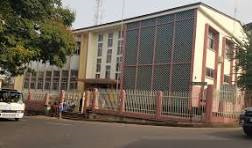By Babah Kanu
babbiuskay@gmail.com
+232-927-562
It is ridiculous and/or amazing to know that the Sierra Leone Library Board operates without moveable official vehicles to facilitate their work. The fact that the institution has libraries in all regions of the country, further accentuated the ridicule and added salt to injury. The importance of the Sierra Leone Library in the educational sector of the country cannot be over emphasized. For such an institution to go without a good transportation system, left me in a ‘turn up for the books’. I was literarily arrested by surprise, when I paid a visit to the office of the Chief Librarian and discovered that the Library operates without moveable official vehicles. Upon entering the gate of the Library, I asked whether the Chief Librarian was in his office. A young man affirmed that since his official vehicle is around, pointing to the derelict poda poda Hiace model vehicle, he might be in the office. My gaze at the vehicle prevented the young man from saying more. I quietly walked upstairs to the office of the Chief Librarian.
Jocularly, I whispered that I saw his one-of-a-kind official vehicle. He bowed his head, but I had sensed the semblance of demeanour, I could not continue but go straight to the purpose of visit. Already, my deep sense of angst to further enquire about the operations of the Sierra Leone Library Board arose; but I cannot get the required answers from the Chief Librarian. I was compelled to write this article that will stimulate an argument for the equipment of an institution that assured my academic prowess.
As a center of learning and research, the Sierra Leone Library still faces several other challenges of digitalization, other than mobility, despite conscious efforts to ensure e-library facilities for readers. Library is generally known as a home for all learners, a characteristic that gives the impression that libraries are the most important asset that should be equipped to create a favouraable learning environment. Therefore, it cuts across all sectors of life.
According to Professor John Abdul Kargbo, a Lecturer of Library Studies in the University of Sierra Leone, the Library Board as stated in the 1959 government white paper on educational development, was established to provide effective library services for children and young pupils, including services for schools. In one of his publications, Professor Kargbo revealed that the Library Board initially provide mobile book supply to schools in smaller towns and villages across Sierra Leone. Overtime, libraries were established in all regions. Research has proven that the Sierra Leone Library Board now operates 25 libraries nationwide.
Information so far gathered indicate that the government has done a great deal to improve the condition of service for staff, but with desire to provide the much urgent needs of the Library Board.
The role of the Sierra Leone Library Board is critical in the implementation of the Free Quality Education in Sierra Leone, by serving as vital resources that grant access to knowledge, facilitate research, encourage literacy, create a favourable learning atmosphere, and advocate for continuous learning among both students and educators.
In Sierra Leone, with the introduction and implementation of the Free Quality Education by the government of President Bio, the Sierra Leone Library Board served as a catalyst for change and the promotion of a favourable learning environment.
Although efforts are geared towards the equipment of these facility in the Free Quality Education, mobility still remain as a key challenge.
Therefore, this article serves as a compelling factor for the provision of mobility to facilitate the work of the Sierra Leone Library Board since our desire is to provide and promote quality education for human capital development.
Recently, the Sierra Leone Library Board celebrated 60years of existence with the promotion of knowledge through books and non-book items. Somehow, the Sierra Leone Library Board has provided education for almost all of the existing literate population of Sierra Leone.
Development partners including the Chinese Embassy, the American Embassy and Book Aid International UK have made frantic efforts to sustain the Sierra Leone Library Board.










